


Share:
First Journey Abroad and the Limitations of AI
Before this project began, I never imagined I would have the opportunity to set foot on the African continent in my lifetime. In the summer of 2025, I participated in the Ministry of Education’s Dream-Building Overseas Program and traveled to Burkina Faso, Africa.
Before departure, I tried every AI tool available, hoping to learn as much as possible about Burkina Faso in advance—partly to mentally prepare myself, and partly because I had no idea how underdeveloped the local area might be, nor what I should bring. In short, Africa is definitely not like advanced countries such as Japan or South Korea, where you can just bring your passport, mobile phone, and credit card and set off.
Unexpectedly, even in the era when GPT has reached version 4.5, there are still places where AI tools can hardly find any information. It wasn’t until I arrived that I realized the internet in Burkina Faso is not well developed, so naturally, local information is not widely available online. The power of AI seemed helpless in this context; instead, survival skills and adaptability became even more important. The historical records of early military expeditions being wiped out due to acclimatization issues became much more tangible to me after setting foot in Africa.
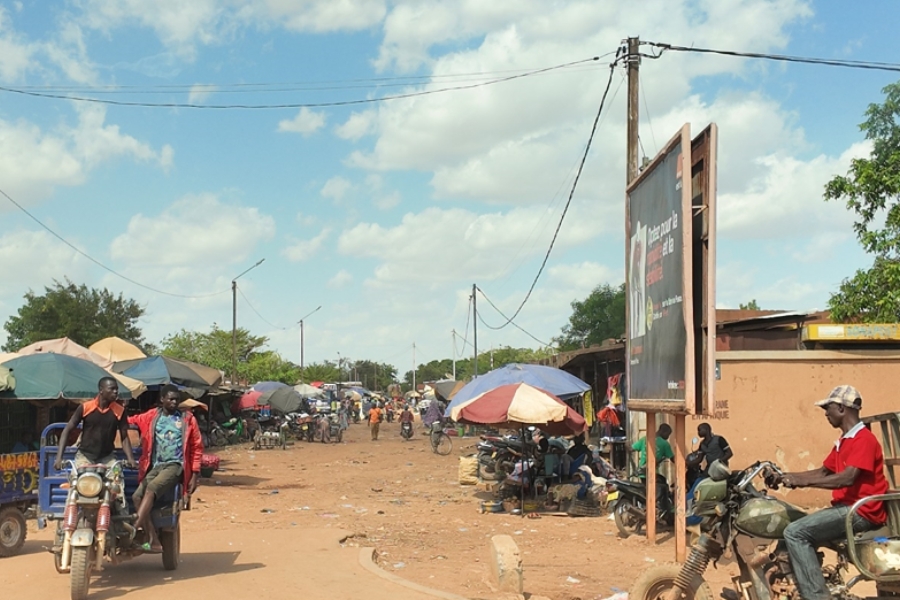
In the summer of 2025, I participated in the Ministry of Education’s Dream-Building Overseas Program and traveled to Burkina Faso, Africa.
University Is the Best Time to Go Abroad
As the saying goes, “Read ten thousand books and travel ten thousand miles.” But how many books must one read before being ready to travel far?
Personally, I think for most people, it’s probably after completing the sophomore year of university. First, due to age restrictions, after turning 20, you can make many decisions on your own without needing a guardian present. Second, after two years of university education, your mind is usually broadened, your horizons expanded, and your perspectives changed. At this point, going abroad is less likely to be a superficial experience. After all, traveling abroad costs a lot, so it’s best to gain as much as possible from the experience. Perhaps by observing the details of daily life, you can discover the reasons for local underdevelopment; perhaps you can feel how cultural differences affect national development; perhaps you can see future development opportunities in these regions; or maybe you’ll suddenly be inspired by local people and things, and bring that inspiration back to Taiwan to promote.

By joining the Dream-Building Overseas Program, I delivered ASUS refurbished computers to remote areas in northern Thailand.
My Professional Transition and Competition Experience
When I first entered university, I was enrolled in the Bachelor's Program of Artificial Intelligence Technology and Application, but later transferred to the Department of Electronic Engineering. The reason I chose Electronic Engineering was actually because I once saw a classmate’s boyfriend share his self-made circuit board on social media. At that moment, I thought, “This is what I want to do in university.”
This circuit board project was called the Deep Bowl Project, which required completion three times, with competitions held after the first two. In my first semester after transferring, I participated in the competition and won second place in the department; in the second semester, I went further and won first place. Afterwards, I submitted my work to the 2024 National College and High School Taigang Innovation and Invention Competition held by Taigang University of Science and Technology, and ultimately won the national championship.
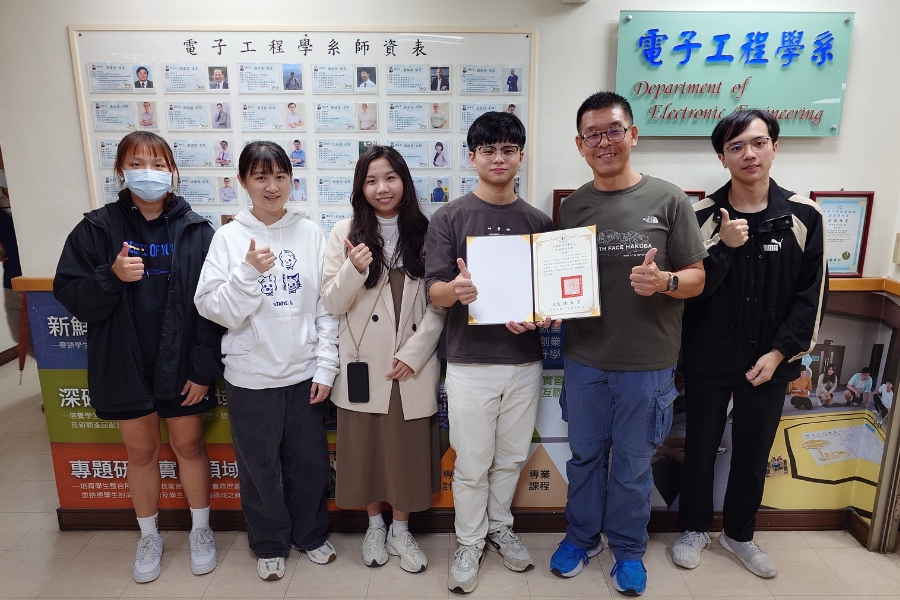
I participated in the “2024 National College and High School Taigang Innovation and Invention Competition” held by Taigang University of Science and Technology and won the national championship.
The circuit board I designed was highly integrated; for the same functionality, I only needed less than one-tenth the area compared to other students. The key to this achievement was my eight years of experience in mobile phone repair before transferring to Electronic Engineering, during which I had seen and repaired countless circuit boards, giving me a clear understanding of industry standards. For me, a circuit board is not just a technical product, but also a work of art.
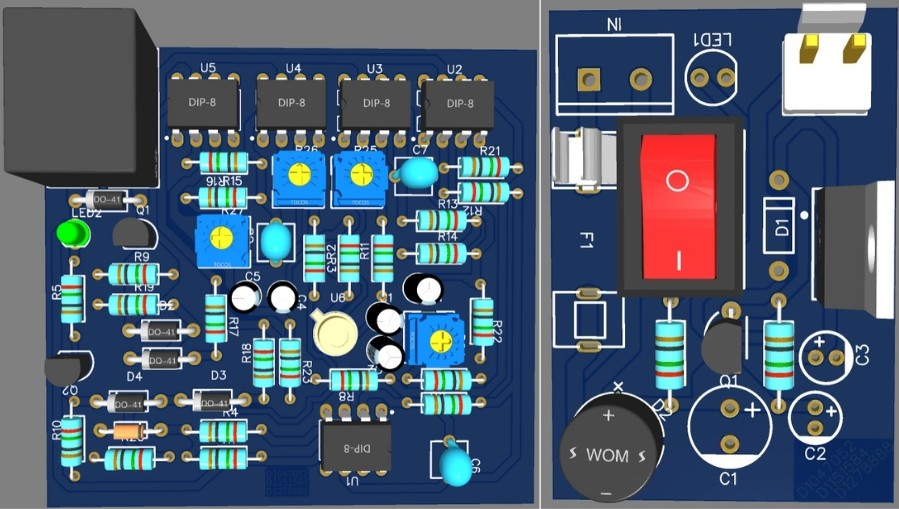
To me, a circuit board is not only a technical product, but also a work of art.
After winning the national championship in the Deep Bowl Project in the second semester, I once considered continuing to develop it, because at that time, almost no one in Taiwan was doing similar research, and I had even planned out the business model. But later, I found that many teams in Mainland China and Europe were already ahead, so the project was suspended. If I had had the opportunity to go abroad and see these works earlier, perhaps I could have done even better.In fact, during university, there are many opportunities to go abroad, some of which don’t require much money—maybe just two or three months of part-time work is enough. I believe that going abroad as a student is the time with the lowest opportunity cost. Once you enter the workforce, it’s much harder to get such opportunities, and your boss is unlikely to let you take one or two months off at a time.If you ask me what help this trip to Africa will bring to my future, I honestly can’t answer, because I don’t know either—maybe it will be useful in the future? Maybe the company will send me to Africa? But in terms of life experience, I think it’s definitely worthwhile. The world is so big—why not go and see it?
Overview of Burkina Faso
The Burkina Faso I visited is located in the west of the African continent, entirely within the Sahara Desert, and is known as the “Land of Honest People” (the meaning of Burkina Faso in French). The official language is French, and it is a former French colony. Due to a single economic structure and puppet regimes, Burkina Faso has remained poor, ranking third from the bottom in the world in per capita GDP until a few years ago. In recent years, with a new government in power, improvements in industrial structure, control of local natural resources, foreign exchange management, and infrastructure construction have pushed per capita GDP up by nearly 70 places.
The international airport in Burkina Faso has no transfer hall, no Wi-Fi, and no shopping street; the customs area is about the size of a classroom. As soon as you leave the airport, you see armed police or soldiers everywhere. At the time, I naively took my camera everywhere, wanting to record everything, but was quickly warned not to take photos. I later learned that regime changes in Burkina Faso are mostly through coups, and the authorities don’t like people taking random photos in the country. The photographer traveling with us had their drone temporarily confiscated, the lens scratched by customs, and was even taken to the gendarmerie for investigation as a suspicious person. Only then did I realize how sensitive the local authorities are to cameras—no wonder there’s not even Google Street View.
Describing the streets of Burkina Faso as a map from a shooting game is quite fitting; the country is dusty due to low asphalt coverage. Our local guide, Rachid, told us that as long as we told the driver where we lived, he would pick us up at the designated location the next day. I was amazed—how could someone remember the way after just one trip? I remembered that when I first started university, I had to open the map every time to find my classroom, and I thought my sense of direction was pretty good. Only after arriving did I realize that there are only a few main roads, all radiating from the capital, and only areas around the main roads have government-supplied water and electricity. So, most people live close to the main roads, and it’s easy to remember the way after just one trip. Those living in the suburbs are often in complete darkness at night; the better-off might light candles or use solar panels, but I didn’t see any energy storage devices.
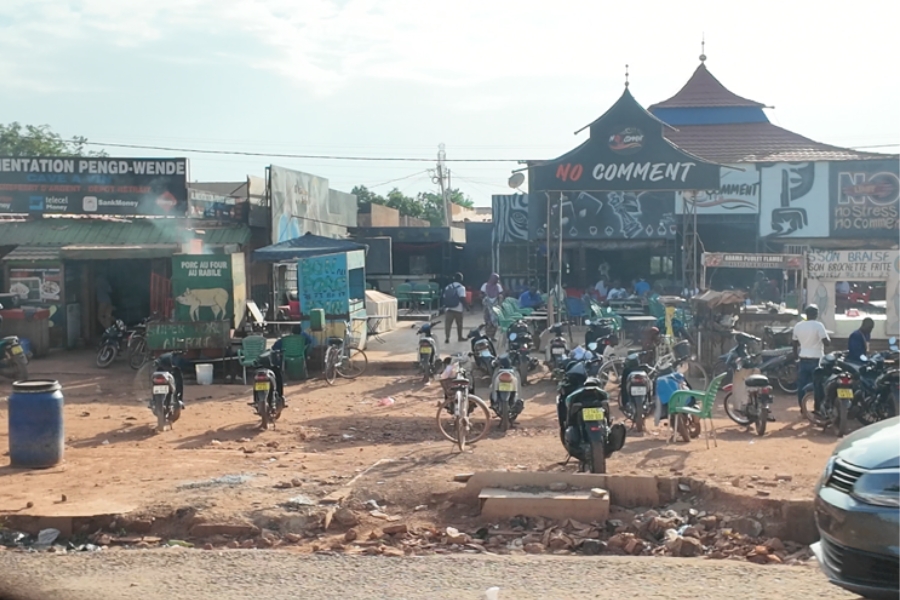
In Burkina Faso, the low asphalt coverage results in dusty streets.
There aren’t many streetlights, and the electricity supply is unstable—half of it is imported from Côte d'Ivoire, and the price per kilowatt-hour is nearly NT$10. Electricity must be prepaid, called “cashpower.” When the French colonized Burkina Faso, they didn’t build much infrastructure, only exploiting local agriculture and minerals, resulting in a single industrial structure. Even if many countries later offered aid, it was difficult to achieve long-term development. If Taiwan’s electricity supply were unstable, with frequent outages, the semiconductor industry couldn’t have developed rapidly or become number one in the world. This shows how important infrastructure is to a country’s industrial development.
Taiwan was one of the countries that provided technical assistance to Burkina Faso. During my month there, we saw traces of Taiwan’s past aid three times—agricultural assistance, solar photovoltaic technology, and tofu factory construction. However, the only project still operating was agriculture; the solar and tofu factory projects were abandoned soon after diplomatic ties were severed.
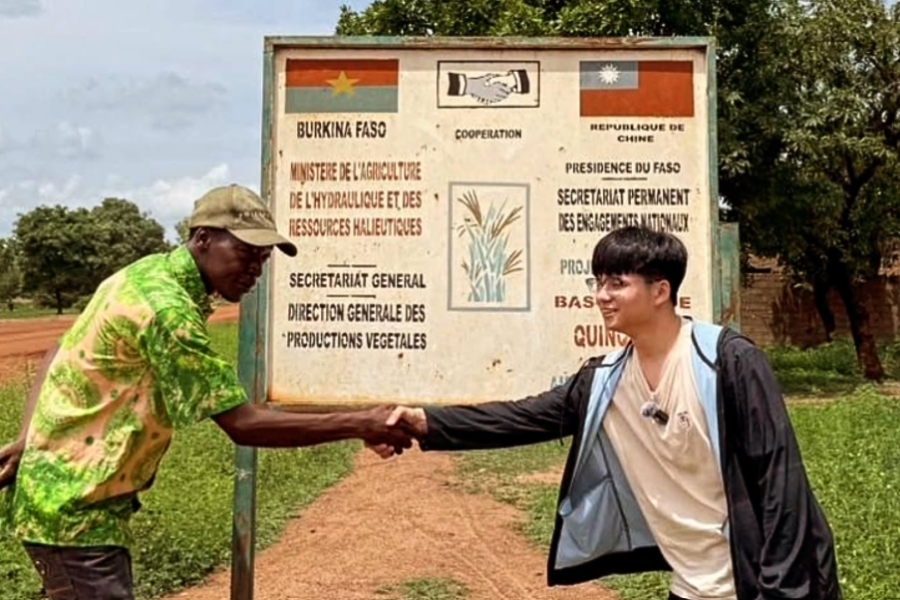
During my one-month stay in Burkina Faso, we saw traces of Taiwan’s past contributions three times, but currently, only the agriculture-related projects are still operating.
There are two main reasons for this: first, education is not widespread, and the literacy rate is the lowest in the world. Even if instruction manuals are provided, locals may not understand how to operate or maintain the equipment, and those who can read may not understand mechanical structures. Second, these devices are advanced for the local context—even if they know what’s broken, they may not have the parts to fix it, or even the tools to open the screws. Once external resources are cut off, anything that cannot be supported by local infrastructure and industry will be abandoned.
Global Connections and Development Opportunities
Currently, Burkina Faso is actively building the nation, including water and electricity facilities, food processing plants, electric vehicle industry, textile industry, aviation industry, airport and highway construction, gold refining, and more, creating many jobs and stabilizing domestic energy demand.
Interestingly, if you commit a traffic violation locally, you’ll be sent to help with national construction for a week instead of being fined. Such a poor country can’t afford to pay for these projects itself—most of the funding comes from loans from the IMF and China, and possibly in the future from the newly established Shanghai Cooperation Organization Development Bank. Borrowing money always comes with penalties, so whether Burkina Faso will align with the Eastern or Western system in the future remains uncertain.
Currently, many industries in Burkina Faso are in cooperation with China, and the renminbi is gradually challenging the dominance of the US dollar. Even a country thousands of miles from China can exchange renminbi for West African CFA francs, showing the significance of China-Africa cooperation. On the flight from Burkina Faso to Ethiopia, about 30% of the passengers were Chinese; on the flight from Ethiopia to Thailand, more than half were Chinese.
The future of the world is unpredictable, but opportunities for development are everywhere. I believe the era of AI is not a crisis, but a turning point for global development. Once infrastructure is developed, coupled with the involvement of Chinese people, the economy will surely develop rapidly, and business models that are already commonplace in Taiwan may easily dominate the local market.
In Conclusion: Read Ten Thousand Books and Travel Ten Thousand Miles!
The knowledge in books only shows its value when applied in real life. Traveling abroad while young is an investment that will never lose value, because many inspirations do not come out of thin air. In the past, only children from privileged backgrounds had the chance to see the world, but now, through the Dream-Building Overseas Program, ordinary students can also broaden their horizons and see a bigger world.
by Department of Electronic Engineering Yi-Sheng Chen
Share:
Related Share